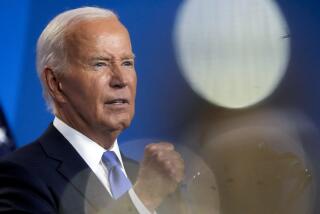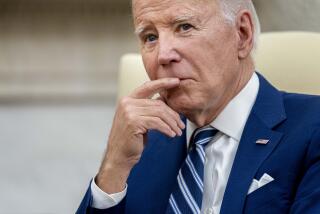The 1988 National Election : Democrats’ Losses at Polls Laid to Staleness of New Deal Creed : Analysis
WASHINGTON — When a Democratic competitor congratulated senior Bush strategist Paul Manaforte on running a “great campaign,” Manaforte shrugged off the compliment. “Basically, we ran unopposed,” he said.
It was easy to find professionals in both parties who agreed with Manaforte: Democratic standard-bearer Michael S. Dukakis missed and mishandled so many opportunities as a candidate that, for many of his fellow politicians at least, he made a mockery of his promise to give the nation competency.
But a closer look at the way the 1988 presidential campaign developed suggests that blaming everything on Dukakis is too easy on Democrats as a whole. The flaws in the Dukakis candidacy were to a large extent symptomatic of fundamental weaknesses in the party that nominated him.
Failed to Develop New Message
Simply put, the Democrats concentrated hard--and successfully--on not making the same mistakes they had made in 1984. But they did not correct the underlying causes of those earlier mistakes: the party’s failure to develop a new political creed and thus an appealing message for voters to replace the time-worn liberalism of the New Deal.
“It seems to me that, in my lifetime, our party has lost the intellectual initiative,” said 43-year-old Chris Scott, president of the North Carolina AFL-CIO. “Since the New Deal, we haven’t really had a good explanation to give the public of what it is we’re trying to do with the government.”
Tuesday’s returns demonstrated the shortcomings of the effort to win the presidency without any ideology at all. Said Democratic pollster Mark Mellman: “This campaign is an indictment of the notion that there is a value-free, ideology-free, passionless politics based solely on pragmatism that will get you elected.”
To be sure, Republican George Bush made some mistakes of his own. His choice of Indiana Sen. Dan Quayle as a running mate raised so many questions about Bush’s judgment and so many doubts about Quayle’s fitness that--by the reckoning of one Bush campaign strategist--it reduced the GOP victory margin by as much as 4 percentage points.
Negativism May Have Hurt Bush
Then, too, some political professionals believe Bush’s unrelenting attacks on Dukakis’ record as Massachusetts governor may have backfired to some extent, making Bush vulnerable to the charge of negativism and helping fuel Dukakis’ late surge in the campaign.
But those miscalculations--mere aberrations in the otherwise masterly execution of the Republican battle plan--offered small consolation to Democrats as they contemplated their fifth defeat in the last six presidential elections.
Of course, no one could reasonably have expected success to come easy for the Democrats in 1988--not with the nation at peace and the economy for the most part relatively healthy.
Still, 1988 presented the Democrats with certain inherent advantages. One was the fact that they would not have to run against Ronald Reagan, by far the most popular Republican leader since Dwight D. Eisenhower. Another was the historical cycle: Not since 1948 had any party maintained its grip on the White House for more than two consecutive terms.
Mindful of those realities, Democrats early convinced themselves that 1988 was their year of opportunity. As they geared up for the campaign, however, instead of finding fresh ideas to face the future, they seemed trapped by the specter of their past defeats--particularly Walter F. Mondale’s landslide loss in 1984.
Specifically, the Democrats--not just Dukakis but the party as a whole--took a series of steps to prevent another 1984 debacle, steps that ultimately did not help and in some cases even hurt their chances in 1988:
--The platform.
The move to make the platform briefer, vaguer and less controversial was led by Democratic National Chairman Paul G. Kirk Jr. It was part of an overall effort by the party to steer away from ideological disputes that included eliminating a mid-term party conference that had been scheduled for 1986.
“A long list of legislative initiatives or specific 10-point programs makes an excellent budget message or State of the Union address, but it does not necessarily make a winning national party platform,” Kirk declared in an address to the Democratic Governors Assn. on Dec. 4, 1987, about six months before the 1988 platform committee began its work.
“A document which Republicans quote to attack Democratic candidates more frequently than Democratic candidates do to promote themselves is neither a unifying nor a winning national party platform,” Kirk said.
Democrats, including nominee Dukakis, dutifully took Kirk’s advice to heart and produced a document about one-tenth the size of past manifestoes and almost devoid of specific solutions for such problems as the budget deficit.
For all of this, the Republicans once again hung the Democratic platform around the party’s neck. This time, they attacked it not for what it said but for what it left out. The platform’s vagueness and its all-too-apparent flight from past Democratic positions gave Bush ammunition to launch his decisive counterattack against Dukakis. He labeled him “the stealth candidate,” then proceeded to define the Democrat as outside the American “mainstream.”
--Super Tuesday.
Resentful of what they regarded as the excessive influence of the Iowa caucuses and the New Hampshire primary on the outcome of their nominating contest, Southern Democrats persuaded legislatures in 14 border and Southern states to hold their primaries on the same date.
According to the blueprint of its sponsors, this mega-contest in the conservative South would counter the liberal stance of the Democratic electorates in the early Northern contests, particularly Iowa. It would force contenders for the nomination to pay more attention to Dixie and help foster the selection of a more conservative standard-bearer, so the argument went.
But what happened on Super Tuesday was almost exactly the opposite of what its planners intended. Lacking the time or money for full-scale campaigns in so many Southern states, most of the candidates lavished more time and money on Iowa and New Hampshire than ever before, hoping to gain a prominence that could translate into strength on the Super Tuesday battlefield.
And most important--and most disastrous for the hopes of the Southern Democrats--the candidates who ultimately benefited the most from Super Tuesday were the two most liberal of the contenders, Dukakis and the Rev. Jesse Jackson--whose highly motivated black supporters constituted a large proportion of the Democratic primary voters in the South.
The reason for the result, as Southern pollster Claibourne H. Darden Jr. pointed out, is that, in their concern for manipulating the mechanics of the primary system, Super Tuesday’s sponsors neglected the ideological and racial elements in the voting.
Neither the Southern Democrats who established the massive primary nor the presidential contenders developed a message that would encourage conservative and moderate Southerners to participate in the Democratic nominating process.
--Interest groups.
Mondale’s endorsement by the AFL-CIO and a number of other powerful liberal interest groups early in the 1984 campaign aided his drive for the nomination but, party leaders became convinced, later made him vulnerable to the charge that he would be overly influenced by such groups as President.
To shield their 1988 standard-bearer from the stigma of interest group liberalism, Chairman Kirk and other party leaders urged interest groups to avoid preconvention endorsements. The groups did not endorse until after the Democratic convention, and Dukakis and other contenders made a show of being independent of the so-called litmus tests established by the groups as criteria for their support.
Nevertheless, Dukakis was successfully tagged as a liberal by Bush and the Republicans. “Even though he avoided the interest group endorsements, we were able to define him as a liberal because he did not have any overall theme or identity of his own,” said Bush strategist Manaforte, a veteran of four previous Republican presidential campaigns.
“The 1988 results show that the labor endorsements weren’t what beat Mondale in 1984,” North Carolina union leader Scott said. “I think the problem is more deeply rooted than that.”
Until Democrats can find a new ideological anthem, Scott said, the party’s supporters will be limited to choosing between, on one hand, candidates like Jesse Jackson, who are good at articulating the old ideological message, and, on the other hand, candidates like Dukakis, who shy away from ideology completely.
Barring a depression or some other calamity, Scott argues, neither type of candidate has much chance of success. “The problem is not that we had the wrong messenger,” he said. “The problem is that we need a new message.”
More to Read
Get the L.A. Times Politics newsletter
Deeply reported insights into legislation, politics and policy from Sacramento, Washington and beyond. In your inbox three times per week.
You may occasionally receive promotional content from the Los Angeles Times.










